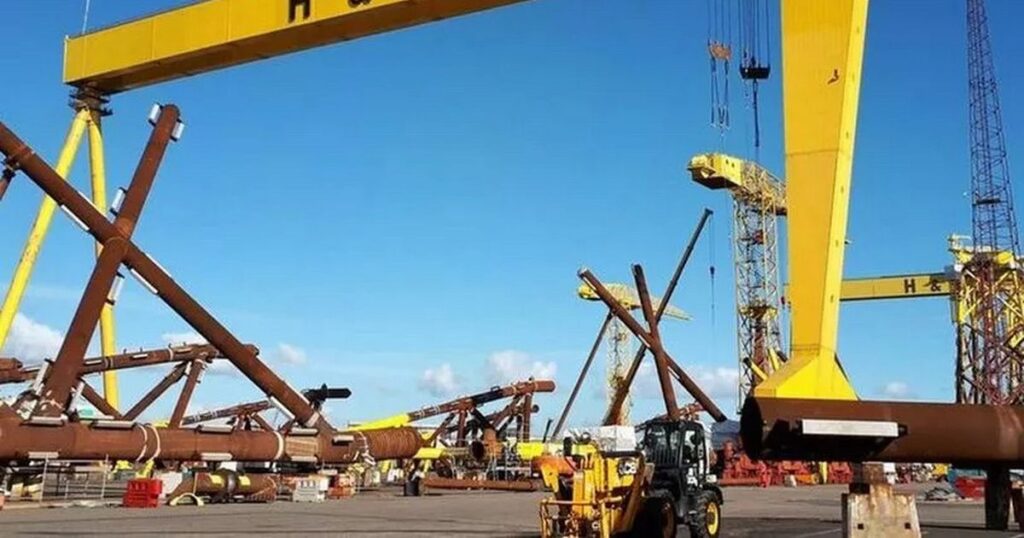Harland & Wolff is set to navigate a critical juncture as it prepares for an upcoming shareholder meeting amidst significant financial turmoil.
With administration fears looming, shareholders await clarity on the shipbuilder’s future during this consequential assembly.
Financial Meetings Under Pressure
Harland & Wolff’s forthcoming shareholder meeting comes amidst tumultuous times for the iconic shipbuilder. The agenda is set to address the company’s precarious financial standing against speculation of impending administration. Interim Chairman Russell Downs, tasked with delivering an update, will confront the formidable challenge of allaying investor fears amidst financial turbulence.
Despite repeated calls for an extraordinary general meeting in preceding months, shareholders have found their efforts rebuffed consistently. Those invested in the company face the unsettling prospect of a potential pre-pack administration scenario, which could preserve the company’s operational capacity while simultaneously eradicating their financial stakes. It is of dire consequence not only for external investors but also for employees who hold stakes in the enterprise.
Corporate Governance Concerns
Corporate governance at Harland & Wolff has been thrust into scrutiny following key departures and revelations. The resignation of Chief finance officer Arun Raman has been succeeded by the troubling confirmation of an ongoing investigation into the alleged misuse of £25 million. This figure marks a significant portion of the company’s capital, sparking concerns about internal controls.
Amidst these financial irregularities, Sky News reported interest from defence contractor Babcock, among others, for a potential acquisition. Such movements hint at strategic interests from external parties who perceive value amidst apparent disarray.
Historical Challenges
Harland & Wolff, famed for its work on the Titanic, is no stranger to adversity.
The company’s contemporary difficulties were exacerbated in July when the Labour government chose not to support a £200 million UKEF loan deemed vital for its operations. This financial setback has been pivotal in the corporate upheaval experienced in recent months, leading to executive departures.
Key leadership figures, including CEO John Wood and Chairman Malcolm Groat, have exited, further unsettling stakeholders. Such exits, combined with board-level resignations, raise deeper concerns about the strategic direction and leadership capabilities at Harland & Wolff.
Impact on Defence Contracts
A £1.6 billion Ministry of Defence contract hangs in the balance as Harland & Wolff grapples with its financial challenges. This significant deal, centered on the construction of warships for the Royal Navy, is under threat, with over 1,000 jobs potentially jeopardised.
The uncertainty enveloping such a critical contract exacerbates worries about Harland & Wolff’s long-term viability, heightening tensions within the defence sector. For the shipbuilder, securing this contract is not merely about survival but about realigning itself back onto a profitable and stable trajectory.
Potential Acquisition Moves
The potential interest from Babcock and other parties underscores the strategic importance of Harland & Wolff in the defence landscape. Any acquisition would reshape the competitive dynamics, possibly rejuvenating the shipbuilder’s prospects.
In light of these developments, investors remain watchful, anticipating potential buyouts or strategic partnerships that could steer Harland & Wolff clear of administration. Such transactions are seen as vital lifelines capable of restoring confidence and ensuring business continuity.
Nevertheless, any acquisition must also contend with regulatory scrutiny and strategic coherence to avoid further destabilising the shipbuilder’s market position.
Stakeholder Reactions
Stakeholders are reacting with a mixture of apprehension and cautious optimism. Employees, many of whom are shareholders, face the dual anxiety of job security and financial investment erosion.
Investors are keenly aware of the potential losses but remain hopeful that strategic maneuvers, possibly involving mergers or acquisitions, could recoup or stabilize their stakes. For many, the coming days will prove decisive in shaping their sentiment towards Harland & Wolff’s governance and strategic direction.
Future Projections
Despite the tumult, there remains a pathway for Harland & Wolff to emerge strengthened from its current plight if managed adeptly. Strategic restructuring, combined with potential external financing or acquisitions, could engineer a turnaround.
Long-term projections hinge on the company securing key contracts, restoring investor confidence, and regaining its foothold in the industry. The upcoming shareholder meeting will prove vital in clarifying the strategic intentions and fostering a collaborative effort towards recovery.
In conclusion, the outcomes of Harland & Wolff’s shareholder meeting will be pivotal.
The decisions taken could either reinforce or undermine confidence, greatly impacting the company’s trajectory.

